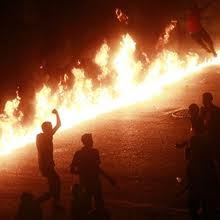Egypt's President Mohammed Morsi's order to
reconvene parliament has been rejected by the country's highest court, which
says its decision to dissolve the assembly is binding. Following Morsi's decree,
the speaker of the dissolved house had called for the MPs to meet on Tuesday 10
July.
Morsi, whose Muslim Brotherhood won most
seats, says the parliament should function until a new election is held. During
a meeting on Monday 9 July, however, the country's Supreme Constitutional Court
said its rulings and decisions were "final and not subject to appeal".
Egypt's Supreme Council of the Armed Forces
(SCAF) – whose original decision to dissolve the parliament was backed by the
court – met in an emergency meeting following the issue of the presidential
decree on Sunday.
Despite rumours of tensions, Morsi and SCAF's Leader Field
Marshal Hussein Tantawi appeared together at a military cadet
graduation ceremony. Last month, SCAF enforced a court order dissolving
parliament because party members had contested seats reserved for
independents.
The military took power last year, after the revolution that
ended former president Hosni Mubarak's 30 year reign. Over the
course of the last couple months, the army has become increasingly unpopular,
with many accusing its leaders of wanting to hold on to power indefinitely.
Morsi, who won the country's first free presidential election
last month, was handed power on 30 June. In his presidential decree, Morsi said
new parliamentary elections would be held 60 days after the constitution had
been agreed by referendum.
For more news and expert analysis about Egypt, please see Egypt Politics & Security.









